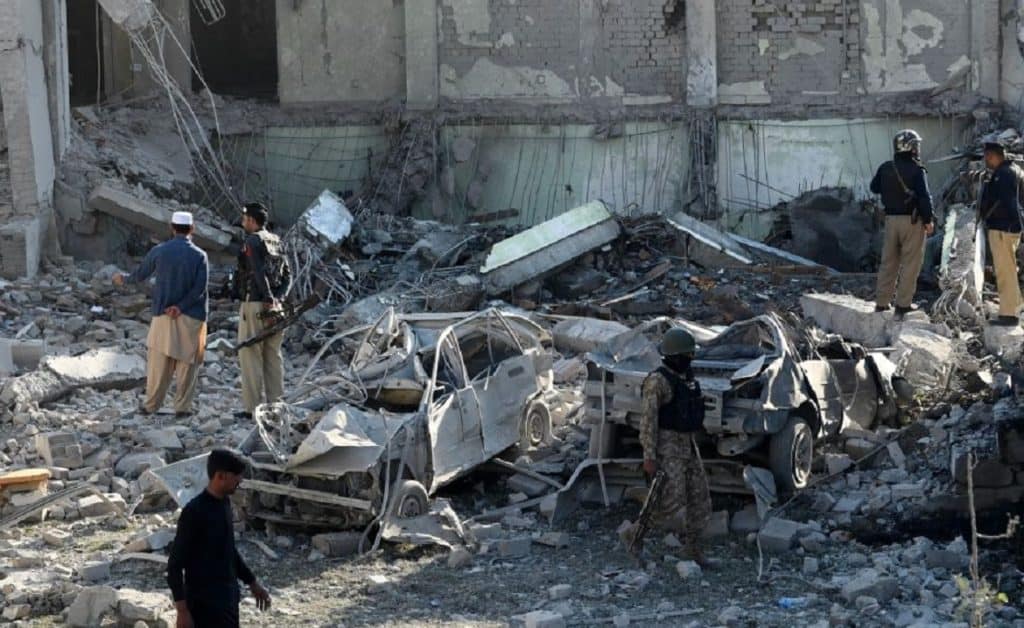By Atta Ullah Khan
Since the Taliban’s seizure of power in Afghanistan in August 2021, terrorists on the Pakistani side of the Durand Line have intensified their activities and armed struggle in different parts of the country. The situation is even more critical in Khyber Pakhtunkhwa, especially in the newly merged districts (NMD) and the areas bordering Afghanistan.

The ‘fall of Kabul’ and the rise to power of the Taliban have caused problems for Pakistan. The dangerous implications for Pakistan can now be assessed. The law and order situation is extremely precarious after the failure of protracted negotiations with the outlawed Tehreek-e-Taliban Pakistan (TTP) party.
The peace process was initiated by the previous PTI government without taking Parliament into consideration. The previous government held talks with the outlawed terrorist organisation in Kabul, the capital of Afghanistan, with the connivance of the former Director General of the Pakistani intelligence agency (DG ISI) Faiz Hamid. The talks were facilitated by the Afghan provisional authorities, patrons and ideological brothers of the extremists. The terrorists demanded the release of their prisoners, a general amnesty, the cessation of military operations against them, and the repatriation of the militants and their families to Pakistan. As a result, terrorists were resettled in Khyber Pakhtunkhwa. It was a reckless move to resettle them as a Confidence Building Measure (CBM). When they unilaterally ended the ceasefire agreed upon by both sides, the current government suspended the talks.
The consequences of the resettlement of terrorists in Khyber Pakhtunkhwa are horrendous. The secular population is suffering. The people are valiantly fighting the scourge of terrorism brought here as a result of the failure of the talks and are sacrificing their lives to emancipate the country from this menace, but with little result so far. We, the people, and the army jawans (army personnel) pay the price for this reckless and continued decision.
Terrorists have gained momentum in recent months. They now use new tactics to damage the armed forces: targeted attacks on army pickets with advanced American sniper rifles, which are very effective; and surprise attacks on military fortifications (mostly public schools and hospitals have been converted into fortifications) and police stations.
The problem is that these incidents are not reported in the mainstream media. There are two reasons for this. First, there is no Internet connectivity in the areas where these incidents are repeated. These are remote areas. Second, the ISPR, the media wing of the Army, does not share or disclose the actual number of casualties resulting from the ‘cowardly attack by the enemy’. Since the army is in control of these areas, no independent media is allowed, under the pretext of the ‘deteriorating law and order situation’, to report on these incidents.
A contingent of 15 has been deployed in the Machi Khel village of Jani Khel in Bannu. It was recently attacked in broad daylight. At first, the terrorists shot down the sentries from afar with the help of sniper rifles. Then a full-scale attack was launched. Eyewitnesses report that the attackers invaded the outpost where the personnel had taken shelter (a hujra or public meeting space was occupied and converted into an army checkpoint). It was vacated afterward.
In our courtyard, a few days ago, a fierce battle between terrorists and Pakistani forces took place at midnight. The battle continued for about three hours. What happened that night. The military outpost of Mali Khel was stormed by terrorists. They outnumbered the army on the ground. The troops under attack called for reinforcements from the nearby army fortress. It is enough to verify the terrorists’ ability to maneuver. How they set a trap for the expected contingent. As the contingent was on its way to help the stranded troops, a well-prepared team of terrorists ambushed them.
The next day, the ISPR announced in a press release two casualties each on both sides. While villagers claim there could be 10-12 casualties on the army side. This is just one example to mention. The ISPR does not share real and true information with the public.
The current year has seen a record upsurge in insurgency. More than 100 incidents have been reported in the KP, resulting in more than two hundred deaths and more than four hundred injured. There is hardly a day when terrorist incidents do not occur: beheadings or targeted killings, attacks on army facilities and police stations, kidnapping of civilians for ransom, burning of public property, such as internet towers, equipment of government or private contractors, and sabotage of development projects in various areas.
Given their violent activities against the armed forces and civilians in the country, was it a prudent decision to hold negotiations with the outlawed TTP? First, how can the state hold negotiations with a group who continues to use violence against its people? Second, negotiating with the terrorists is as giving them legitimacy and equal status. And this only will embolden them and their morale and nothing else.
But there are still people who argue that talks with them is a viable option. Let’s ask a very basic question. Negotiation is the name for “give and take”. Suppose Pakistan grants amnesty to all terrorists, despite their heinous crimes against the country’s armed forces and civilians. What do they have to offer in return? Are they willing to lay down their arms? Are they prepared to abandon their radical ideology? Are they willing to integrate into civil society? Will they not be involved in illegal activities against the state? Can they abandon their demand for the revocation of the Fata merger? But the situation seems to be the opposite.
The process of disarmament, demobilization and reintegration (DDR) can only be achieved if they are willing to accept some of the government’s demands. Only then would the government have to compromise, excluding the merger with Fata and the application of Shari’a. There cannot be one state and two systems. A state within a state should not be allowed. Apparently, the insurgents seem to have nothing to offer.
Unfortunately, the ongoing turmoil in the country after the 9 May massacre has diverted the attention of politicians. In political circles, there is hardly any mention of the resurgence of terrorism. The same applies to the media. There is a complete media blackout. No reports, no headlines, no talk shows.
I believe that this is a collective problem that needs immediate attention but, unfortunately, our politicians are bickering amongst themselves and the establishment is busy engineering the whole process. All stakeholders must unite for the cause and pay attention to what is happening in Khyber Pakhtunkhwa. A collective response can be a panacea.
Author: Atta Ullah Khan – Graduate in International Relations from University of Sargodha, Punjab, Pakistan
(The opinions expressed in this article are solely those of the author and do not necessarily reflect the views of World Geostrategic Insights)
Image Credit: Getty Images







